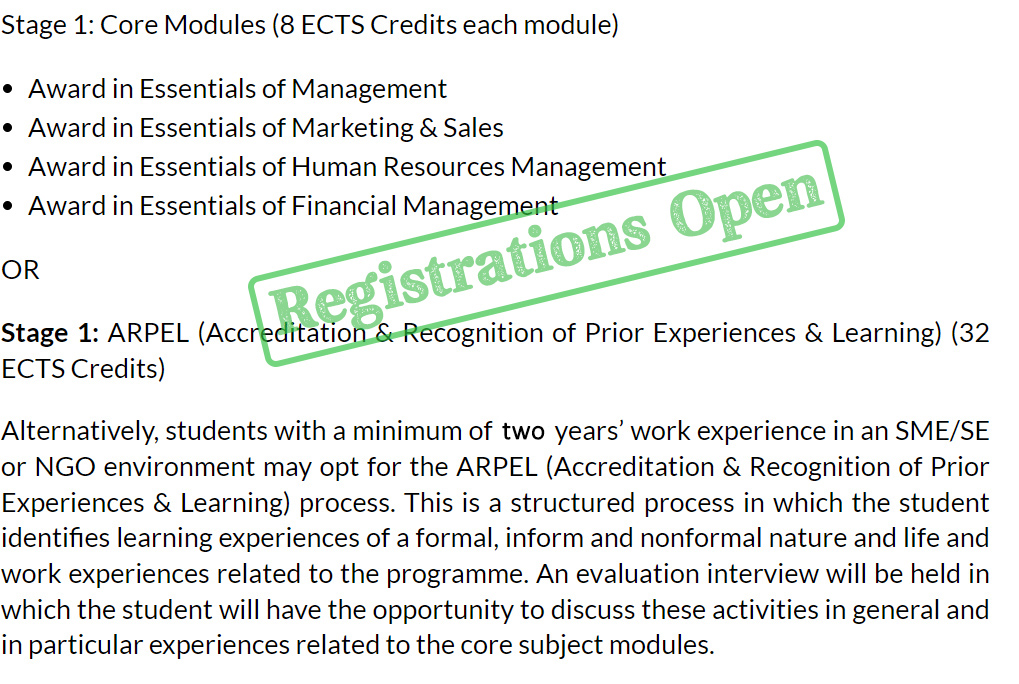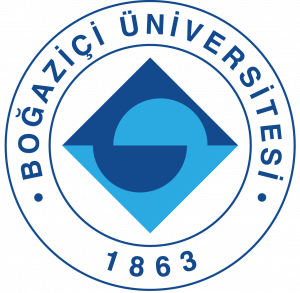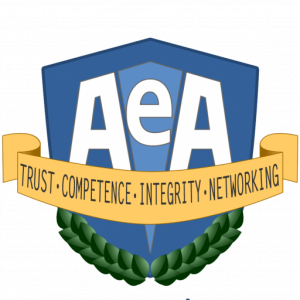Undergraduate Higher Diploma in Social Entrepreneurship

The Undergraduate Higher Diploma in Social Entrepreneurship is a programme developed by Advenio eAcademy collaboration with the following European Universities:-
- University of Ioannina, Greece (https://www.uoi.gr/)
- Universita’ Politecnica delle Marche, Italy (https://www.univpm.it/)
- Boğaziçi University (BU), Turkey (http://www.boun.edu.tr/)
and established NGOs:-
- Solidarity Overseas Service (SOS), Malta (https://www.sosmalta.org/)
- Academy of Entrepreneurship (AKEP), Greece (https://akep.eu/)
- Forum AIC, Italy (https://www.forumaic.org/)
- Imece, Turkey (https://imece.com/)
This programme will include THREE components.
Stage 1 will include 4 Core modules OR the ARPEL Process for recognition of prior learning and experience

Stage 2 requires students to complete 8 specialist modules
These subject modules provide students with a broad exposure to the challenges of running an NGO and in transforming an NGO into a Social Enterprise.
Stage 2: Specialist Modules (4 ECTS Credits each)
- Award in Creativity & Thinking Skills for Social Enterprises
- Award in Project Management for Social Enterprises
- Award in Legal Frameworks for Social Enterprises
- Award in Working with Apprentices/Volunteers for Social Enterprises
- Award in Social Enterprise Development
- Award in Fund Raising for Social Enterprises
- Award in Risk Management for Social Enterprises
- Award in Good Governance for Social Enterprises
Stage 3 of the programme is a research project OR an Internship & Embedded Project Report
Stage 3: Research Project (26 ECTS Credits)
The Research Project is a research-based activity to be undertaken after successful completion of Stages 1 and 2 of the programme. Students will work independently to identify research interests, gaps in knowledge, explore hypotheses and develop a research plan. The Research Project will allow students to hone their analytical and investigative skills by participating in an active research project under a faculty advisor to produce usable data sets, public presentations, and abstracts suitable for publication.
OR
Stage 3: Internship & Embedded Project Report (26 ECTS Credits)
Alternatively, students may opt for an internship within the organisation that they are involved with, OR a suitable organisation. Within this internship they are expected to carry out an embedded research project based on the data and information to be made available by the host organisation. Students would be able to utilise internal data to research and report on management issues that are of particular concern to the organisation. The focus of the embedded report would be its implementation within the organisation.
The Internship Programme provides an opportunity to combine theoretical education with applied work experience. Internships are distinguished from independent study in that interns will be working directly with a professional, rather than on their own. Through journal writing, mentor support, a midterm check-in, and a final analytical paper, interns will have the opportunity to gain perspectives on their internship that might otherwise miss in the rush of work. This final paper is to be completed within a period of 12 weeks after the completion of the internship period and is to focus on a business development within the host organisation. This final report is to provide full details on the planned development and its implementation.
This course is aimed to equip participants with the necessary management skills, tools and techniques to advance their own enterprises and to more reliably inform and guide the development of their organisation.
For any students that complete the Undergraduate Diploma in Social Enterprises without completion of Stage 1 have the option to complete Stage 2, Stage 3 and the supplementary module in Stage 3. This works out at Stage 2 – Specialist modules X 8 (32 ECTS) and the Stage 3 – Research Project/Internship X 1 (26 ECTS) and supplementary module X 1 (4 ECTS ). The supplementary module is Award in Practical Applications of Business Simulation.
Entry Requirements:
Eligibility for the full programme or component stages is based on:
- Pass in a Level 5 Diploma or higher OR
- Grade C or better in a Level 4 Diploma (e.g. Advanced Level certificates) and a minimum of 2 years work experience AND
- Students whose first language is not English and whose previous qualifications were in a language other than English will be required to produce evidence of IELTS level 5 competence, or equivalent
Note 1: Prospective students over the age of 25 are eligible to apply for the full programme without a level 4 diploma, as long as they provide evidence such as a suitable CV and a work reference showing the skills and competences gained through their work experience (at least 2 years).
Target Group
- Level 4 and Level 5 students from a non-business related field who recognise the impact that Social Enterprise concepts will have on their careers and therefore wish to further develop their competences in order to prepare them for their continued progression in their careers.
- management staff within NGOs and Social Enterprises that wish to build on their practical knowledge with comprehensive, specialised and theoretical knowledge based current research in the field and international best practices
- management staff with relevant work experience that may not be employed within Social Enterprises but wish to develop skills and competencies that will facilitate their move to Social Enterprises.
Note: This course seeks to equip participants (Individuals already in possession of at least 2 years relevant work experience) with the skills and competences to be effective decision makers at middle management level within SME & SE environments.
Overall Course Objectives:
By the end of the course, the learner will be able to:
- Apply entrepreneurial / social entrepreneurial knowledge and understanding in a manner that indicates a professional approach to work or study
- Organize activities/tasks for staff and interns/volunteers
- Apply the core principles of project management to identify resources and any related constraints, to plan for their use in the Social Enterprises’ operations to ensure that deliverables are provided as promised.
- Manage the risks associated with the success of the social enterprise
- Apply the analytical and collaborative skills practiced during a simulation in a business environment.
- Apply knowledge in Social Entrepreneurship studies to develop the research plan adequate to the research question
- Implement new plans, procedures or ideas within the organisation
Hours of Total Learning:
Contact Hours: 466
Self-study hours: 1646
Supervised placement and practice hours: 24
Assessment hours: 114
Total Learning Hours: 2,250
Teaching & learning:
Online – using elearning platform from www.aea.academy
Onsite – Easy School of Languages, 21 St. Ursula Street, Il-Belt Valletta VLT 1230
Language of Instruction: English
Assessment Methods:
Core Modules
Assignment / Case-Study – (50% of the module grade)
Forum Discussions – Forum Responses (30% of the module grade)
Tutorial Participation – tutorial sessions (20% of the module grade)
Specialist Modules
Assignment / Case-Study – (60% of the module grade)
Forum Discussions – Forum Responses (20% of the module grade)
Tutorial Participation – tutorial sessions (20% of the module grade)
Students need to get an aggregate of 50% marks from the above to pass a module.
Fee Structure:
A registration fee of €100 is required for direct applicants, and €60 for applicants referred by registered agents. This fee must be paid in full before the recruitment interview and is non-refundable if the interview is unsuccessful. Successful applicants will have their registration fee deducted from their total tuition fee payment.
– Undergraduate Higher Diploma in Social Entrepreneurship (90 ECTS) – Course Fee: €6,030 for Online (74 weeks part time) / €7,930 for Blended (52 weeks full time)
– Undergraduate Diploma in Social Entrepreneurship (64 ECTS) – Course Fee: €4,920 for Online (48 weeks part time)/ €6,520 for Blended (48 weeks full time)
– Arrangements will also be made to host students for individuals core course modules of EQF/MQF Level 5 – 8 ECTS (6 weeks duration) :- Online : €610 / Blended €810
– Arrangements will also be made to host students for individuals specialist course modules of EQF/MQF Level 5 – 8 ECTS (6 weeks duration) :- Online : €410 / Blended €610
Scholarship Schemes for Maltese residents
Get Qualified Scheme – 70% refund of course fee as a tax rebate
Intakes:
Intake #1: 29/01/2024
Intake #2: 11/03/2024
Intake #3: 22/04/2024
Intake #4: 03/06/2024
Intake #5: 15/07/2024
Intake #6: 02/09/2024
Intake #7: 14/10/2024
Intake #8: 25/11/2024
Admission Process:
- Submit the official application, Application Link : https://forms.office.com/e/Btvb30TM7q
- Send the support documents
Contact Details: admin@aea.academy / info@aea.academy
Click here to download the Programme Leaflet
The programme includes different stages and modules:
Click here to download the ARPEL process guideline support document
Register Here

Award in Essentials of Management
EQF/MQF Level 5

Award in Essentials of Marketing & Sales
EQF/MQF Level 5

Award in Essentials of Human Resources Management
EQF/MQF Level 5

Award in Principles of Financial Management
EQF/MQF Level 5

Award in Creativity & Thinking Skills for Social Enterprises
EQF/MQF Level 5


Award in Project Management for Social Enterprises
EQF/MQF Level 5
In collaboration with


Award in Legal Frameworks for Social Enterprises
EQF/MQF Level 5


Award in Working with Apprentices/Volunteers for Social Enterprises
EQF/MQF Level 5
In collaboration with


Award in Social Enterprise Development
EQF/MQF Level 5

Award in Practical Applications of Business Simulation.
EQF/MQF Level 5

Award in Fund Raising for Social Enterprises
EQF/MQF Level 5

Award in Risk Management for Social Enterprises
EQF/MQF Level 5

